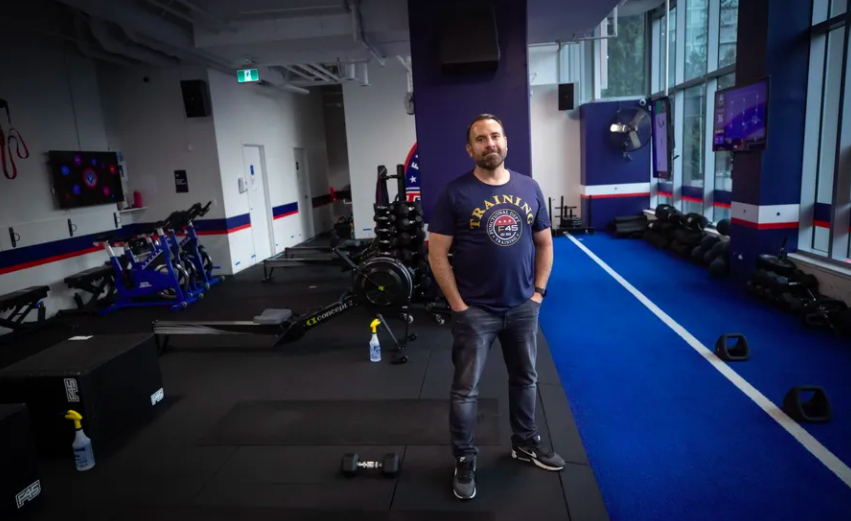:format(jpeg)/cloudfront-us-east-1.images.arcpublishing.com/tgam/WEXNF5YO4ZAWTAXKQ6UGSOI6WU.jpg)
Cortney Lessard, in one of his F45 franchises in Vancouver, bet was that people would emerge from the pandemic with a renewed focus on their health and a reinvigorated social appetite.
Source: DARRYL DYCK/THE GLOBE AND MAIL
While many fitness facilities have permanently closed since the pandemic started, Cortney Lessard and his investors opened two more F45 Training gyms, with a third launching soon, bringing their total to five franchises across Vancouver and Squamish, B.C.
“Definitely a leap of faith,” says Mr. Lessard, who is also the global fitness company’s sales director for Western Canada.
The bet was that people would emerge from the pandemic with a renewed focus on their health and a reinvigorated social appetite. That’s despite a surge in more convenient, less expensive online fitness options over the past 20 months, including the launch of Apple Fitness+ alongside dozens of small boutique gyms offering their own online options.
It’s a gamble that Mr. Lessard says has paid off as more people crave in-person connection as they sweat.
“We’ve seen our numbers … jump overnight because of the vaccine passports. Everyone is ready to come back,” he says. “I think people are done staying at home … they want to get back to community. They want to interact with people.”
Mr. Lessard’s F45 franchises were among the thousands of gyms that offered online classes when fitness facilities were ordered closed during the pandemic lockdowns.
“It wasn’t ideal,” he says. “We were keeping the lights on like everybody else. But we kept [members] engaged and when we reopened, they came back to the gym.”
:format(jpeg)/cloudfront-us-east-1.images.arcpublishing.com/tgam/BB5WGNFX6ZA6XLQXCB2CRASLNM.jpg)
Cortney Lessard cleans equipment at one of his F45 franchises in Vancouver.
Source: DARRYL DYCK/THE GLOBE AND MAIL
His team worked with health authorities to make their studios safe and put members at ease upon return, including removing some equipment and reorganizing the flow of the F45 high-intensity interval workout to create more space. Those changes will continue going forward, he says, adding no COVID-19 cases have been linked to his facilities.
Mr. Lessard’s expansion goes against the industry trend: More than 42 per cent of 6,000-plus fitness facilities across the country have closed permanently since the pandemic started, according to the Fitness Industry Council of Canada.
The number of closings could rise once the federal wage subsidies end this month, says Sara Hodson, president of the council and chief executive officer of Live Well Exercise Clinic.
The council is asking the federal government to support the industry, including a proposal to allow Canadians to include gym memberships and services as a medical expense on personal taxes, alongside other eligible costs such as physiotherapy and dietician consultations. It’s also a way to encourage physical fitness as a preventive health measure, she says.
Most fitness outlets in Canada are small businesses with a few locations, Ms. Hodson says.
“These are the people being impacted,” she says, adding that even larger franchises such as F45 are usually owned and operated by people in the community.
Ms. Hodson points to industry peers in global jurisdictions that have reopened ahead of Canada, and says those who survive should thrive.
Some gyms are seeing higher membership numbers today than they did pre-COVID.
“That’s a sign that our industry will rebound.”
Movati has reopened all of its locations since the lockdowns and recently added a new location in Edmonton. Once child vaccinations are available, the company will reopen the child-care centres at its facilities, which will bring back even more clients, he says.
“It was extremely difficult,” co-founder and CEO Chuck Kelly says of the pandemic period. “We’ve been fortunate to manage our way through this, but there’s going to be a lot of damage in our industry.”
Movati clubs are large, around 65,000 square feet each, and while costly to run, the wide-open space has become a benefit in the physical distancing era, Mr. Kelly says. During the shutdown, the company invested in heating, ventilation and air-conditioning upgrades and improvements to air filtration, which helped lure back many members.
While overall numbers are still down from prepandemic times, members who have returned to in-person training are using the facilities more than ever before, Mr. Kelly says.
“It is rebuilding steadily,” he says, adding that members, on average, are coming in 30 per cent more often than before COVID came along.
“The people who are back, who feel safe … they’re more focused on taking a more active role in their own personal health,” he says.

 Facebook
Facebook
 X
X
 Pinterest
Pinterest
 Copy Link
Copy Link

